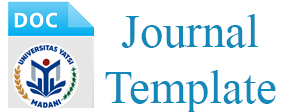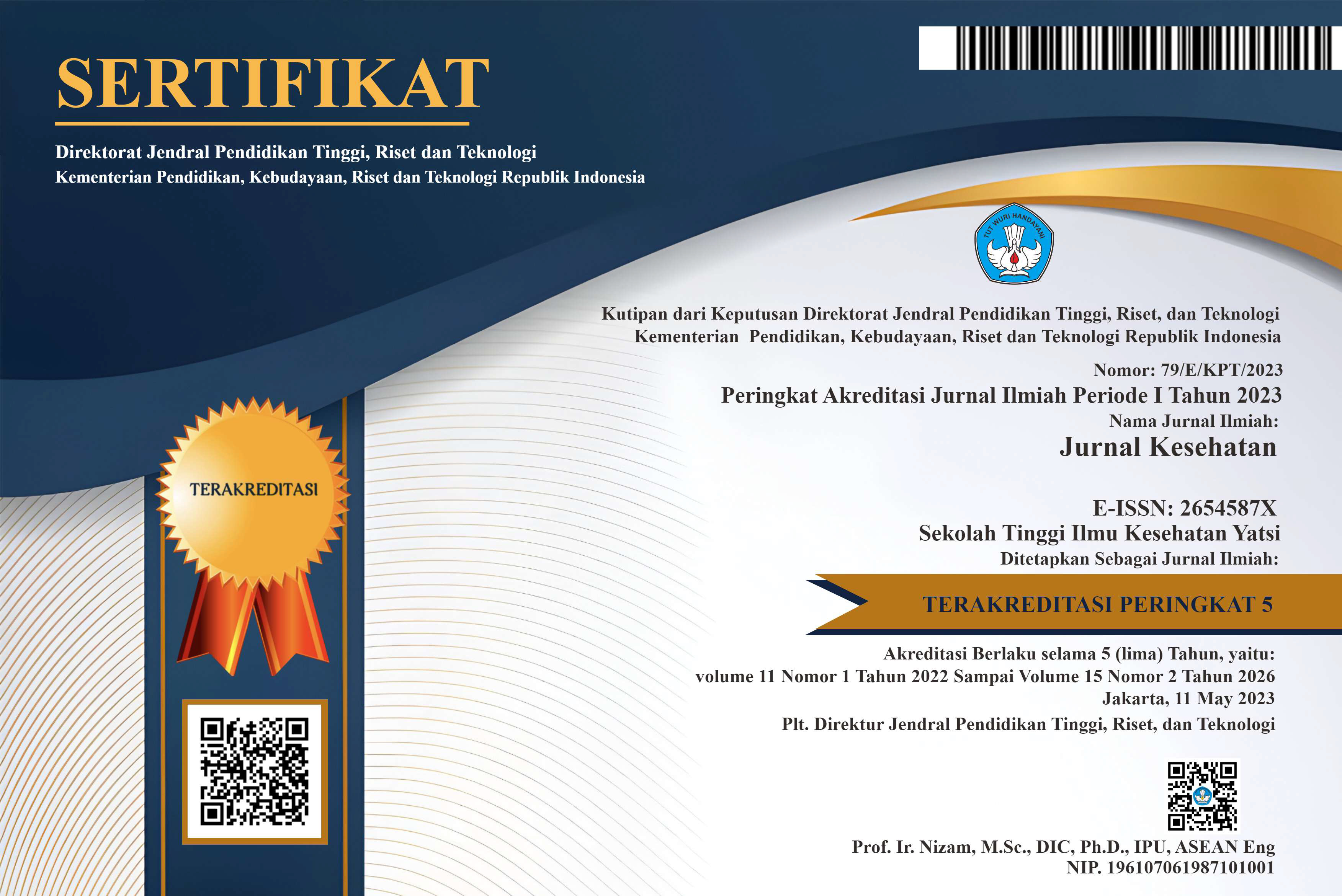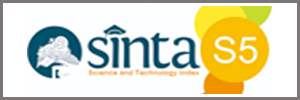Studi Deskriptif Karakteristik Dukungan Suami Dalam Pemberian ASI Eksklusif
Abstract
Exclusive breastfeeding is an effort to prepare a healthy next generation from an early age. In providing breast milk, mothers need support from various parties, one of which is their husband. Social support is defined as a source of support obtained from other people, which can be from various sources, one of which is a partner or loved one. Husbands are one of the important people in a mother's life. The aim of this research is to determine the characteristics of husbands in providing exclusive breastfeeding to breastfeeding mothers in Kepuharjo, Cangkringan. This research is a quantitative descriptive study with a cross sectional approach. The research results show that the majority of the frequency distribution of husbands' informative support is in the good category, namely 52.3%. The majority of the frequency distribution of husbands' emotional support is in the good category, namely 55.8%. The frequency distribution of the majority of husbands' instrumental support is in a balanced category between good and poor, namely 50%. The majority of husbands' appraisal support frequency distribution is in the good category, namely 54.7%.
References
Agunbiade, O. M., & Ogunleye, O. V. (2012). Constraints to exclusive breastfeeding practice among breastfeeding mothers in Southwest Nigeria: Implications for scaling up. International Breastfeeding Journal. https://doi.org/10.1186/1746-4358-7-5
Annisa, L., & Swastiningsih, N. (2015). Dukungan Sosial dan Dampak Yang Dirasakan Oleh Ibu Menyusui Dari Suami. Jurnal Fakultas Psikologi, 3.
Arikunto, S. (2013). Prosedur Penelitian : Suatu Pendekatan Praktik. In Jakarta: Rineka Cipta (Ed. Revisi). Rineka Cipta.
Azwar, S. (2016). Sikap Manusia Teori dan Pengukurannya. Pustaka Pelajar.
Bahiyatun. (2014). Buku Ajar Asuhan Kebidanan Nifas Normal. EGC.
Binns, C., Lee, M., & Low, W. Y. (2016). The Long-Term Public Health Benefits of Breastfeeding. Asia-Pacific Journal of Public Health. https://doi.org/10.1177/1010539515624964
Brock, E. G., & Long, L. (2019). Breast feeding. Obstetrics, Gynaecology & Reproductive Medicine, 29(5), 136–140. https://doi.org/10.1016/j.ogrm.2019.02.003
Deoni, S., Dean, D., Joelson, S., O’Regan, J., & Schneider, N. (2018). Early nutrition influences developmental myelination and cognition in infants and young children. NeuroImage, 178, 649–659. https://doi.org/10.1016/j.neuroimage.2017.12.056
Dias, C. C., & Figueiredo, B. (2015). Breastfeeding and depression: A systematic review of the literature. Journal of Affective Disorders, 171, 142–154. https://doi.org/10.1016/j.jad.2014.09.022
Diepeveen, F. B., van Dommelen, P., Oudesluys-Murphy, A. M., & Verkerk, P. H. (2017). Specific language impairment is associated with maternal and family factors. Child: Care, Health and Development, 43(3), 401–405. https://doi.org/10.1111/cch.12451
Ditjen Bina Gizi & KIA Kemenkes RI. (2015). Rencana Strategis Program Tahun 2015-2019. Kementerian Kesehatan RI, 1–13.
Edmond, K., Newton, S., Hurt, L., Shannon, C. S., Kirkwood, B. R., Mazumder, S., Taneja, S., Bhandari, N., Smith, E. R., Honorati, M., Fawzi, W., Piwoz, E., Bahl, R., Yoshida, S., & Martines, J. C. (2016). Timing of initiation, patterns of breastfeeding, and infant survival: Prospective analysis of pooled data from three randomised trials. The Lancet Global Health. https://doi.org/10.1016/S2214-109X(16)00040-1
Figueiredo, B., Canário, C., & Field, T. (2014). Breastfeeding is negatively affected by prenatal depression and reduces postpartum depression. Psychological Medicine, 44(5), 927–936. https://doi.org/10.1017/S0033291713001530
Fithriany. (2011). Pengaruh Karakteristik Ibu dan Dukungan Suami Terhadap Pemeriksaan Kehamilan di Kecamatan Kuta Cot Glie Kabupaten Aceh Besar. Sumatra Utara.
Fu, I. C. Y., Fong, D. Y. T., Heys, M., Lee, I. L. Y., Sham, A., & Tarrant, M. (2014). Professional breastfeeding support for first-time mothers: A multicentre cluster randomised controlled trial. BJOG: An International Journal of Obstetrics and Gynaecology, 121(13), 1673–1683. https://doi.org/10.1111/1471-0528.12884
Glanz, K., Rimer, B. K., Viswanath, K., Blalock, S. J., Bone, L. R., Brewer, N. T., Butterfoss, F. D., Champion, V. L., Epstein, R. M., Evers, K. E., Jr., J. R. F., Fisher, E. B., Fransisco, V. T., & Gary, T. L. (2015). Health Behavior and Health Education Theory, Research, and Practice (4th ed.). John Wiley & Sons, Inc.
Hahn-Holbrook, J., Holt-Lunstad, J., Holbrook, C., Coyne, S. M., & Lawson, E. T. (2011). Maternal Defense. Psychological Science, 22(10), 1288–1295. https://doi.org/10.1177/0956797611420729
Holmberg, K. S. M., Peterson, U. M. C., & Oscarsson, M. G. (2014). A two-decade perspective on mothers’ experiences and feelings related to breastfeeding initiation in Sweden. Sexual & Reproductive Healthcare : Official Journal of the Swedish Association of Midwives, 5(3), 125–130. https://doi.org/10.1016/j.srhc.2014.04.001
Ida dan Irianto, J. (2015). Pemberian Dukungan untuk Menyusui ASI Eksklusif Enam Bulan di Puskesmas Kemiri Muka Depok Jawa Barat. Jurnal FKM-UI. 2011.
Isaacs, E. B., Fischl, B. R., Quinn, B. T., Chong, W. K., Gadian, D. G., & Lucas, A. (2010). Impact of Breast Milk on Intelligence Quotient, Brain Size, and White Matter Development. Pediatric Research, 67(4), 357–362. https://doi.org/10.1203/PDR.0b013e3181d026da
Jenkins, J. M., & Foster, E. M. (2014). The effects of breastfeeding exclusivity on early childhood outcomes. American Journal of Public Health. https://doi.org/10.2105/AJPH.2013.301713
Kemenkes RI. (2009). Undang-Undang Nomor 36 Tahun 2009 tentang Kesehatan.
Kemenkes RI. (2012). Peraturan Pemerintah Nomor 33 Tahun 2012 Tentang Pemberian Air Susu Ibu Eksklusif.
Kemenkes RI. (2018). Buku saku pemantauan status gizi. In Buku saku pemantauan status gizi tahun 2017 (pp. 7–11).
Khan, J., Vesel, L., Bahl, R., & Martines, J. C










